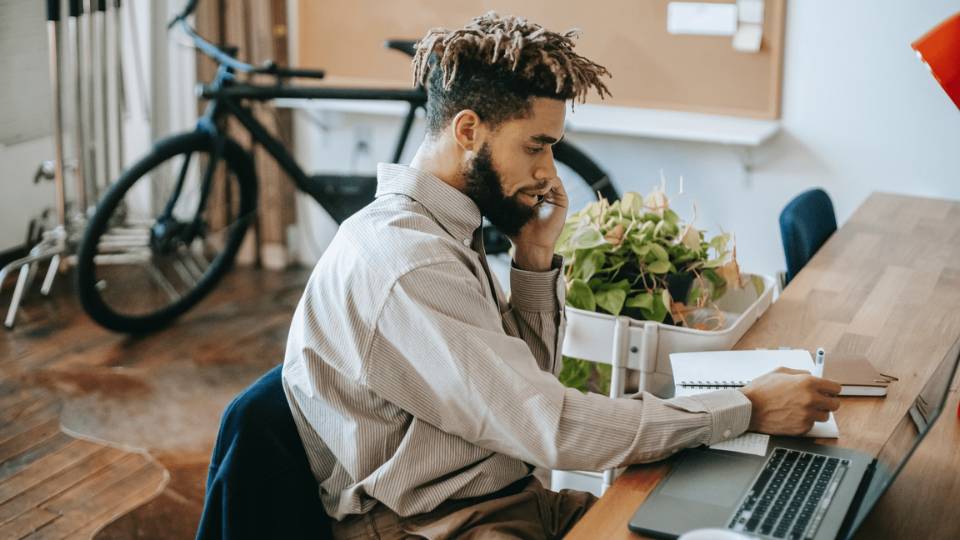Recording phone calls: How to do it, what are the benefits and is it legal?

Recording a phone call is a breath of fresh air. It is so incredibly handy! Did you momentarily forget whether you had agreed to meet on 14 or 15 June? Was it 10:00 or 11:00? Just grab your call recording and you immediately know what you agreed on.
So call recording is definitely an advantage. However, there are some snags: what about the GDPR legislation? You know, the one that has also been bombarding you with cookie notifications since 25 May 2018.
It's all about privacy.
Because while those cookie notifications may sometimes be very annoying, they are very important to us as consumers. It gives you more control over what information you do or do not share and offers you more protection.
So how do you record conversations legally and what are the benefits? We'll walk you through it! ↓
Last updated: 22 July 2024
How do you record phone calls?
To get right to the point: you cannot simply listen back to phone calls or record a phone call without an additional app. Android phones and iPhones simply do not support this.
There is a very good reason for this: there are in fact legal implications to phone call recording and Android and iPhone probably do not want to be associated with this in any way.
Also, you cannot "turn on" call recording through your mobile provider (think Vodafone or TELE2). Nor do they currently offer this.
So, how do you do it?
The only thing you need to record a call is an additional app. There are several apps available, but you can also use the call recording feature of Rinkel. This feature, which is available in the Expert subscription, will allow you to turn call recording on and store your calls for 90 days so you can listen back to them within the Rinkel app.
Want to keep your recorded calls even after 90 days? Then you can download them from the My Rinkel environment.
The benefits of recording a phone call
"Welcome to the customer service department of Company XYZ. This call may be recorded for training purposes. Please stay on the line. A member of staff will speak to you soon."
How many times have we heard phrases like this by now? Large companies often make eager use of it to improve their services as they go along.
Recording telephone calls used to be reserved for the big boys. This was because such calls were stored locally, which made it very expensive and costly. Especially if they were long conversations!
Nowadays, recordings are stored in the Cloud, making this important feature now affordable and accessible to small businesses as well.
Welcome to the customer service department of Company XYZ. This call may be recorded for training purposes. Please stay on the line. A member of staff will speak to you soon.
But, apart from for training purposes: what other advantages are there in recording a phone call?
- Need a third opinion? Then just have your colleague listen back to the call recording. Saves you both time and effort.
- Telephone agreements are also binding. When you record conversations, you have proof that you (or a client) did or did not enter into this agreement.
- An extra reminder after an important conversation: you no longer have to rely on your notes alone.
- Had an interview? Turn your recording up loud and let Word or Google Docs dictate your interview. Saves a whole lot of time in editing.
Improving customer service with call recording
As we already mentioned above, call recording can be a powerful tool for training your customer service team. By recording customer interactions, you can provide valuable feedback and improve the overall quality of service. So how do you do this?
Real-life examples: Recorded calls offer real-life examples of customer interactions. Trainers can use these recordings to highlight both positive and negative aspects of customer service. For example, a call that went particularly well can be used to show best practices, while a call that didn't go as smoothly can highlight areas for improvement.
Identifying Common Issues: Analysing recorded calls can help you identify common issues or frequently asked questions. By understanding these patterns, you can train your team to handle these issues more efficiently, leading to quicker resolutions and happier customers.
Performance Review: Call recordings allow managers to review the performance of individual team members objectively. By listening to how agents handle calls, managers can provide specific feedback and recognise areas for improvement. This targeted feedback helps team members grow and excel in their roles.
Is recording phone calls legal?
The laws around recording phone calls differ for consumers and businesses. For instance, a consumer does not have to indicate in advance that a conversation is being recorded. As a business, however, you must.
In addition, as a recording party, you must also participate in the conversation yourself. If you do not, it will be seen as wiretapping. This is illegal for 'ordinary citizens'.
Want to know more about the legal implications of recording phone calls? Then read the opinion of the Personal Data Authority or contact a lawyer. Rinkel is a telecoms organisation and cannot (and should not) give advice on the legal implications.
When you turn on the call recording function within My Rinkel, you agree that you are responsible for complying with legal requirements. This sounds scary, but in fact it is nothing more than participating in the conversation and informing you in advance that you are recording the conversation.
TIP: Record a voicemail or order a professional voice-over announcing this!
Wanneer je de gespreksopname functie aanzet binnen My Rinkel stem je in dat je zelf verantwoordelijk bent om aan de wettelijke eisen te voldoen. Dat klinkt eng, maar in feite is het niets anders dan deelnemen aan het gesprek en van te voren meedelen dat je het gesprek opneemt.
TIP: Spreek een bandje in of bestel een professionele voice-over waarin je dit aankondigt!
Setting up call recording within My Rinkel
Your My Rinkel environment is completely set up for your use. That means you can control everything yourself in the platform. Also your call recording!
Your recorded calls are kept in My Rinkel for 90 days. After this period, they are deleted from our servers and are therefore really gone. Fortunately, you can easily download them before then!
Recording a phone call is available for Expert users and for all types of phone numbers. So: whether you have a 085 number, 088 number or a regional number, you too can record calls.
Read how to set up call recording within My Rinkel in our FAQ.
Please note that as long as you do not have call recording enabled, phone calls will not be recorded. This, in the context of the GDPR legislation. So do you want to keep a telephone conversation as evidence, or reflect on it after a discussion? Then this is only possible if you have turned on call recording beforehand.





